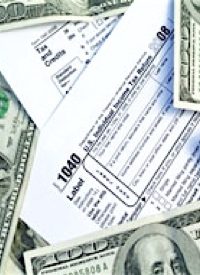
Expiration of the Bush-era cuts will ignite a tax increase of $165 billion, spiking a bottom rate of 10 percent and top rate of 35 percent to 15 percent and 39.6 percent, respectively. "Taxmageddon is a $500 billion, one-year tax hike that hits the economy on Jan. 1, 2013," notes Curtis Dubay of the Heritage Foundation.
Also included in the tax hikes are: Cutting the child tax credit from $1,000 per child to $500; returning the marriage penalty; a $124 billion payroll tax cut will expire; and the dividends tax will boost from 15 percent to as high as 39.6 percent. Moreover, a temporary adjustment in the alternative minimum tax, which originally targeted the "very rich," will affect more than 30 million taxpayers next year.
"Almost the entire tax code has been put on a year-to-year lease, and in some cases, month-to-month lease, which is no way to run a tax system," asserted Scott Hodge of the Tax Foundation.
Despite the ongoing rhetoric over tax cuts only benefiting the wealthy, expiring the $500 million in Taxmageddon cuts would impact all income groups, with the lower- and middle-income classes bearing the brunt of the burden. "Taxmageddon falls 70 percent on middle and low income families. That's because 60 percent of the Bush tax cuts were for middle- and low-income taxpayers," said Dubay. "No American will be unscathed at the end of this year," Hodge added. "Taxmageddon hits all of us."
Undoubtedly, the tax hit, which would spur a free-fall in Americans’ disposable income, would have an adverse effect on the country’s already stale economic state. Jim Capretta, former Associate Director at the White House Office of Management and Budget, says it would translate into "an economy that's about one to two percentage points smaller than it otherwise would have been, and unemployment that's a full percentage point higher than it otherwise would have been."
Mr. Dubay, writing for the Heritage Foundation blog, detailed how the economy and Americans will be affected by Taxmageddon:
If Congress fails to act, workers won’t have to wait very long to feel the effects. Every payday, they would see a jump in their payroll tax as it takes a bigger bite out of every paycheck. And that only reflects the direct hit they’ll face. The health care surtax on investment income and salaries over $250,000 — which begins in 2013 along with five other tax hikes — would slow job creation, because it would take away resources from businesses, investors, and entrepreneurs.
Other Taxmageddon tax hikes, such as the expiration of the "tax extenders," the rise of the death tax, and end of 100 percent expensing for business investment, would also slow the economy. These would make it harder for those out of work to find a job or for those looking for a new opportunity to land a better job. It would also slam the stock market, making it harder to rebuild depleted retirement savings.
The New American’s Bob Adelman expounded on the looming Taxmageddon debacle earlier this month, and suggested that economic uncertainty would not be the lone casualty of the $500-million tax hike:
And then there’s the IRS and its problems. If Congress changes nothing, the IRS is fully prepared with the new rules and rates and forms. But if Congress waits until the last possible moment to address the issue, then, according to IRS Commissioner Douglas Shulman, "you could have a real disaster in the filing season where there’s total confusion." Few have much sympathy for any problems the IRS might have, but it’s possible that the tax filing date scheduled for April of 2013 might have to be pushed back, exacerbating the deficit because of the delay in collecting the taxes.
Naturally, one would think the potential economic destruction stemming from Taxmageddon would prompt immediate action from Congress. Ordinarily, the answer is probably yes. But such action does not come easy in an election year. "It's my guess that nothing will happen on any of these issues until after the election," Mr. Hodge suggested. "Here we have a case where many in Congress will be retiring, maybe even a president. How do you fix a system with that uncertainty?"
But while keeping taxes low is ideal, the ballooning national debt is the underlying culprit. Reducing taxes is a boon for the economy; however, concurrently reducing spending is imperative, because taxes are what finance government spending. In turn, the debt now being passed on from generation to generation is leaving the economy at serious risk.
As Rep. Allen West (Fla.) indicated this week at a rally in Wellington, Florida, if the federal government doesn’t drastically reduce the debt burden, our children and grandchildren will be left with a fiscal calamity so catastrophic it will rival the fiscal Armageddon now confronting Europe:
If you can look at your children, if you can look at your grandchildren, and bend them over the barrel, and say "I’m not working so you can have a bright future," then you will have just snapped the DNA of the American patriot. You will have just said, "we will not pass on the genome of liberty, freedom, and democracy to the next generation." You will have just said that it’s okay that America ends up going down the path of Portugal, Italy, Ireland, Greece, and Spain, to the economic collapse that looms before us.
Related article: $5 Trillion Tax Hike Coming



